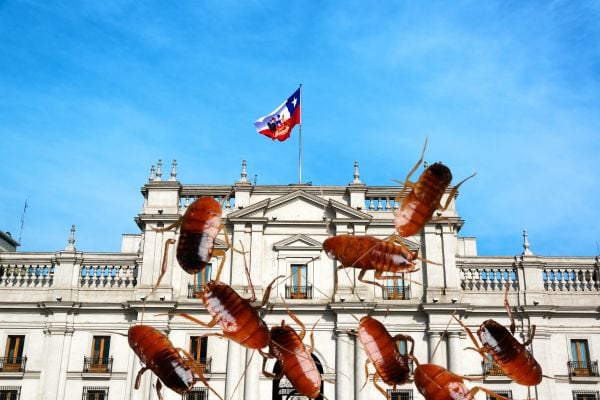Even as his column “Parásitos” rails against a “bloated state” rife with “operatives,” Cristián Valenzuela Bustos —a top adviser to José Antonio Kast— is listed on the Public Senior Management (Alta Dirección Pública) panel that takes part in the evaluation and selection of public-sector executives, according to the 2024 report of the Public Senior Management System reviewed by Fast Check CL. The overlap between his role within that institution and his anti-bureaucracy rhetoric underscores a political contradiction at the heart of the campaign.
Kast adviser on the ADP panel: what the 2024 SADP report shows
According to the 2024 annual report, the Public Senior Management System (SADP) maintains a panel of 54 “expert professionals” who sit on selection committees for second-tier executive posts. Cristián Valenzuela appears on that list. The document also notes that 6 of the 54 are currently suspended because they hold positions in the active administration; the report specifies the composition and status of the members.
The key point for the public debate: the Republican Party presidential candidate’s adviser on the ADP panel coexists with a message that brands the state as “bloated” and “captured.”
“Parásitos”: what Valenzuela said
“In Chile, the state isn’t sick; it’s rotten.”
“The state feeds off the people, not the other way around.”
“Parasites have no political color.”
“Public spending is out of control, debt is exploding, and public employees have grown by 50% over the last 10 years…”
Those lines —published in his column— clash with his presence on the ADP panel, a state body created to professionalize and bring transparency to appointments.
Context: Transparency Council debunks Kast’s “100,000” claim (official 2023–2024 data)
The underlying debate is not abstract. The Council for Transparency (CPLT) compared September 2023 vs. September 2024 and put the change in central government headcount at 9,400 — far from the 100,000 hires Kast claimed for the entire period. Over that span, the State Administration went from 832,211 to 841,613 employees; of that total, 449,443 belong to the Central Administration (53%) and 392,170 to municipalities (47%). The public debate captured the contrast: government spokesperson Camila Vallejo called that figure “totally and absolutely false” and Sebastián Piñera’s former budget director Matías Acevedo labeled it “fake news.”
Moreover, the CPLT clarifies that the number reflects net headcount variation (hires minus departures), not gross “hirings,” and that most personnel work in essential services — Health and Education — with a predominance of fixed-term contracts. That factual context makes the gap between the maximalist diagnosis in “Parásitos” and the institutional role Valenzuela holds on a state selection mechanism even clearer.
Kast adviser on the ADP panel: how it works and what they can earn
Law No. 19,882 stipulates that panel experts are paid per meeting: a minimum of 5 UF (CLP $195,000) and a monthly cap of 60 UF (CLP $2,340,000), depending on attendance.
Important: merely being on the roster does not mean serving every month; compensation depends on actual participation in committees. Even so, the political question remains one of consistency between denouncing the “state caste” and serving within a state selection mechanism.
The Republican network within the ADP: Soza and Figueroa
The same roster includes Carmen Soza (attorney, former budget office official) and Sebastián Figueroa (executive director of Acción Republicana), according to Fast Check CL. Both are part of the strategic ecosystem around Kast—per media profiles—and, like Valenzuela, appear as expert professionals on the SADP panel. This is not an isolated case; it reflects an embedded presence within the body that evaluates who reaches senior posts in the state.
Consistency and accountability
The fact that a Kast adviser sits on the ADP panel while decrying a “bloated apparatus” is not a mere technicality; it is a matter of consistency and probity in the middle of a campaign. The Public Senior Management system was created to protect merit and curb political capture; thus, when its members denounce the state even as they participate in its governance, public scrutiny is not just warranted—it is indispensable.










